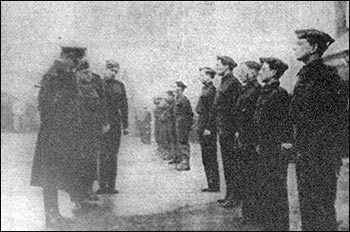The Rushden Echo, 25th December, 1942, transcribed by Gill Hollis
Boy Cadets Question The Colonel - Rushden Company Praised at Inspection
Sixty-five boys in battledress – the members of the Rushden and District Cadet Company – sat on a school hall floor at Rushden on Sunday morning and tried to think out posers for a Colonel.
 |
|
Cadet Inspection
|
Col. A. P. A. Helps, O.B.E., M.C., had given the lads a “tough” inspection and a lot of advice. He said it was their turn to tell or ask him something.
“Is there a chance,” asked one of the bigger boys, “of getting better rifles for training?”
“A very reasonable request,” answered Colonel Helps, with a smile. “I saw you to-day with some old carbines which came out of the South African War. I suppose you couldn’t get anything in them, and if you did fire them they would blow up, I should think.”
After explaining that the country had suddenly been faced with the task of finding modern weapons for millions of men, Col. Helps said there had not been enough rifles to go round. They would still do their best to get some, but the best thing to train with was a wooden dummy rifle. The best part of Kitchener’s Army in the last war was trained with these.
The Colonel also learned that the hoys were all eager for heavy military boots.
The March-Past
The Company first paraded in Station-approach under the command of its O.C., Lieut. F. W. Summerlin, who was assisted by Lieut. H. W. Moore and 2nd-Lieut. F. Tysoe. Drawn up smartly in open order, it was joined by the equally smart drum and bugle band of the Rushden A.T.C. Squadron. Colonel Helps carried out a keen inspection and shortly afterwards took a salute at the foot of Station-approach as the Company marched towards Hayway.
A winter training routine was afterwards carried out at the Intermediate School and the boys had a great surprise when the Colonel, instead of merely looking on, took personal charge and showed them what he wanted in the way of discipline and quick thinking. He drilled a squad after doing the movements himself, using his cane as a rifle, and then took in hand a smaller squad of recruits.
Next visiting the P.T. Class (under Mr. J. W. Craker), he saw the boys go over the vaulting horse. Soon he was sending them running about the hall on errands which tested their quickness of thought; then he became the hider in a game of hide-and-seek. He found there were not enough boxers to give him a show with the gloves, but on entering some of the classrooms he saw some interesting signalling, map reading and rifle work, the signallers showing keen enjoyment of their work with headphones and tapping keys.
“A Good Unit”
In a speech to the boys, Colonel Helps declared: “I think you are a good unit, and it is very encouraging to see fellows keen like you are. I could only wish that the whole youth of the country was in something like this cadet unit.
“We don’t want a militarist nation, but we do want a disciplined nation, not only from the military point of view, but for civil life. We have a job in front of us after the war – a hell of a job as a nation – and that will only be done by discipline.
“Of course, I know that the British character doesn’t take kindly to discipline. We are an independent lot, and that’s what made us top of the world; but we rather lacked discipline, and until we found it in this war we didn’t pull our full weight.”
Discussing the value of drill and of steadiness on parade, Colonel Helps said: “In a soldier I don’t like the quality of mind that shifts; it’s bad, it’s rotten.”
“I think you have done pretty well,” he added. “I think you are fortunate in your officers, and I think you must have helped them by giving attention. I think you are very keen and want to be fine soldiers and young men.”
Those who went into the Army from the Cadet Force would have the advantage of the others, said the Colonel in conclusion.
All the boys on parade came from Rushden and Higham Ferrers, and none was over the age of 17.
|